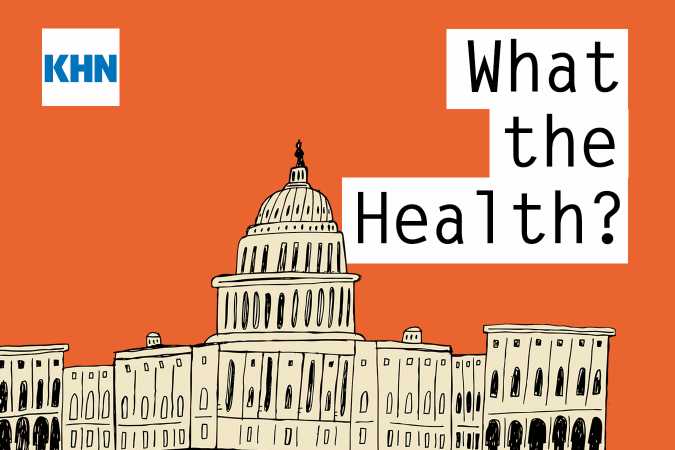The Host
Having spent its entire first week choosing a speaker, the Republican-led U.S. House finally got down to legislative business, including passing two bills backed by anti-abortion groups. Neither is likely to become law, because they won’t pass the Senate nor be signed by President Joe Biden. But the move highlights how abortion is sure to remain a high-visibility issue in the nation’s capital.
Meanwhile, as open enrollment for the Affordable Care Act nears its Jan. 15 close, a record number of people have signed up, taking advantage of renewed subsidies and other help with medical costs.
This week’s panelists are Julie Rovner of KHN, Margot Sanger-Katz of The New York Times, Alice Miranda Ollstein of Politico, and Sarah Karlin-Smith of the Pink Sheet.
Panelists
Among the takeaways from this week’s episode:
- The House now has a speaker after 15 rounds of full-chamber roll call votes. That paved the way for members to be sworn in, committee assignments to be made, and new committee chairs to be named. Cathy McMorris Rodgers (R-Wash.) and Jason Smith (R-Mo.) will be taking the helm of major health committees.
- McMorris Rodgers will lead the House Energy and Commerce Committee; Smith will be the chairman of Ways and Means. Unlike McMorris Rodgers, Smith has little background in health issues and has mostly focused on tax issues in his public talking points. But Medicare is likely to be on the agenda, which will require the input of the chairs of both committees.
- One thing is certain: The new GOP-controlled House will do a lot of investigations. Republicans have already reconstituted a committee to investigate covid-19, although, unlike the Democrats’ panel, this one is likely to spend time trying to find the origin of the virus and track where federal dollars may have been misspent.
- The House this week began considering a series of abortion-related bills — “statement” or “messaging” bills — that are unlikely to see the light of day in the Senate. However, some in the caucus question the wisdom of holding votes on issues like these that could make their more moderate members more vulnerable. So far, bills have had mostly unanimous support from the GOP. Divisions are more likely to emerge on topics like a national abortion ban. Meanwhile, the Title X program, which pays for things like contraception and testing for sexually transmitted infections, is becoming a hot topic at the state level and in some lawsuits. A case in Texas would restrict contraception availability for minors through this program.
- It’s increasingly clear that abortion pills are going to become an even bigger part of the abortion debate. On one hand, the FDA has relaxed some of the risk evaluation and mitigation strategies (REMS) from the prescribing rules surrounding abortion pills. The FDA puts these extra restrictions or safeguards in place for certain drugs to add additional protection. Some advocates say these pills simply do not bring that level or risk.
- Anti-abortion groups are planning protests in early February at large pharmacies such as CVS and Walgreens to try to get them to walk back plans to distribute abortion pills in states where they are legal.
- A growing number of states are pressuring the Department of Health and Human Services to allow them to import cheaper prescription drugs from Canada — or, more accurately, importing Canada’s price controls. While this has long been a bipartisan issue, it has also long been controversial. Officials at the FDA remain concerned about breaking the closed supply chain between drugs being manufactured and delivered to approved U.S. buyers. The policy is popular, however, because it promises lower prices on at least some drugs.
- Also in the news from the FDA: The agency granted accelerated approval for Leqembi for the treatment of Alzheimer’s disease. Leqembi is another expensive drug that appears to work, but also carries big risks. However, it is generally viewed as an improvement over the even more controversial Alzheimer’s drug Aduhelm. Still to be determined is whether Medicare — which provides insurance to most people with Alzheimer’s — will cover the drug.
- As the Affordable Care Act enrolls a record number of Americans, it is notable that repealing the law has not been mentioned as a priority for the new GOP majority in the House. Rather, the top health issue is likely to be how to reduce the price of Medicare and other health “entitlement” programs.
Email Sign-Up
Subscribe to KHN's free Morning Briefing.
Plus, for extra credit, the panelists recommend their favorite health policy stories of the week that they think you should read, too:
Julie Rovner: The Washington Post’s “Social Security Denies Disability Benefits Based on List With Jobs From 1977,” by Lisa Rein
Margot Sanger-Katz: Roll Call’s “Providers Say Medicare Advantage Hinders New Methadone Benefit,” by Jessie Hellmann
Alice Miranda Ollstein: The New York Times’ “Grant Wahl Was a Loving Husband. I Will Always Protect His Legacy.” By Céline Gounder
Sarah Karlin-Smith: KHN’s “Hospitals’ Use of Volunteer Staff Runs Risk of Skirting Labor Laws, Experts Say,” by Lauren Sausser
Also mentioned in this week’s podcast:
- KHN’s “States Challenge Biden to Lower Drug Prices by Allowing Imports From Canada,” by Phil Galewitz
- Politico’s “Next Frontier in the Abortion Wars: Your Local CVS,” by Alice Miranda Ollstein and Lauren Gardner
- KFF’s “Millions of Uninsured People Can Get Free ACA Plans,” by Jared Ortaliza, Justin Lo, Gary Claxton, Krutika Amin, and Cynthia Cox
Credits
To hear all our podcasts, click here.
And subscribe to KHN’s What the Health? on Spotify, Apple Podcasts, Stitcher, Pocket Casts, or wherever you listen to podcasts.
Source: Read Full Article
